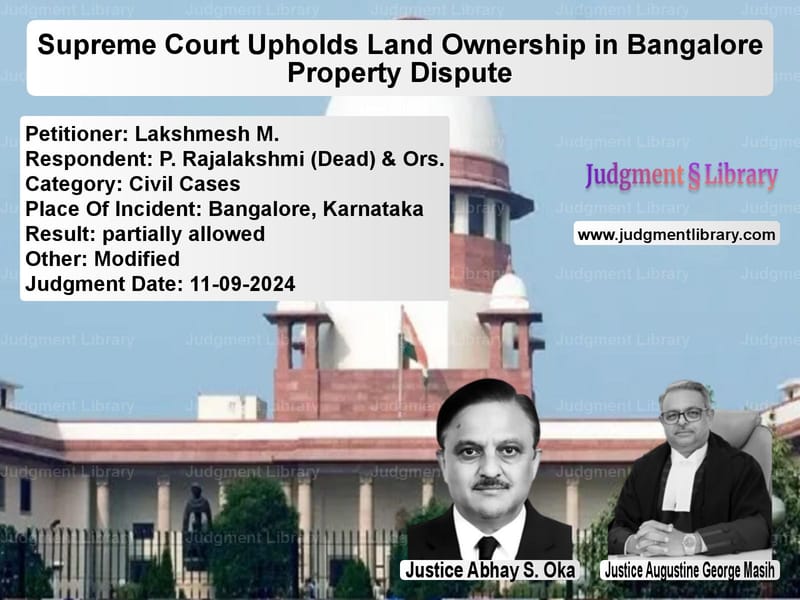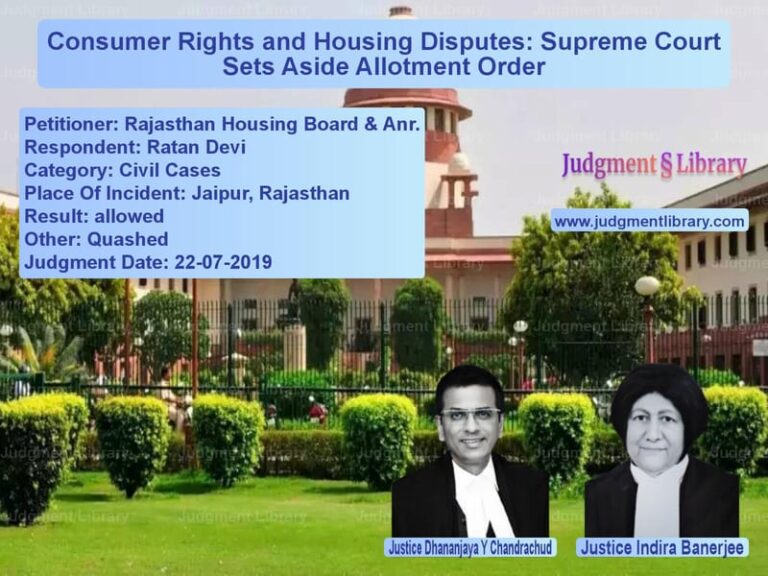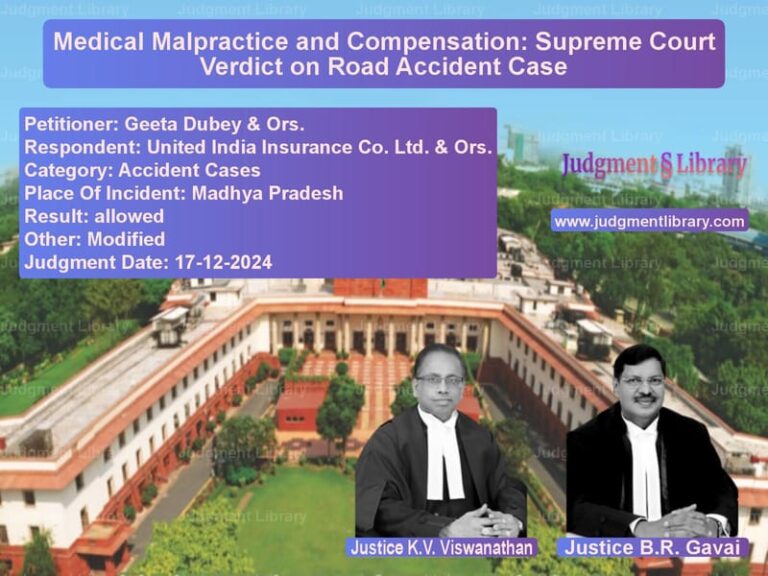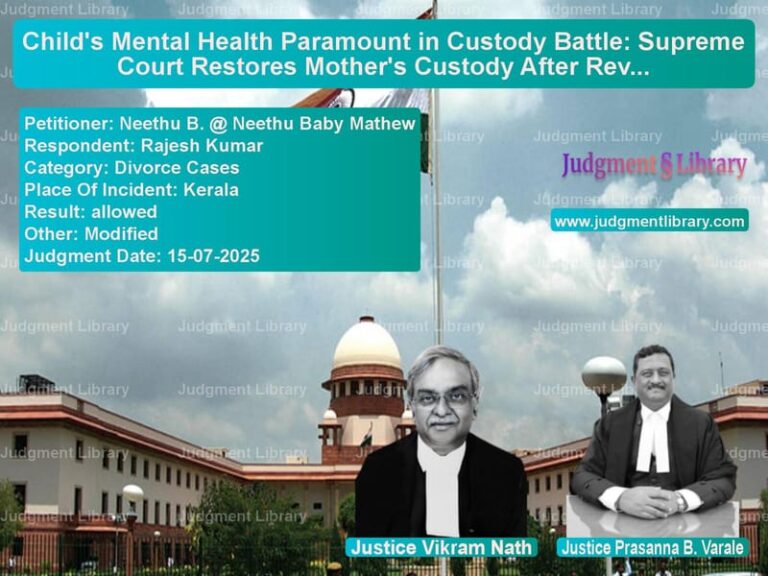Supreme Court Upholds Land Ownership in Bangalore Property Dispute
The case of Lakshmesh M. vs. P. Rajalakshmi (Dead) & Ors. is a crucial judgment by the Supreme Court regarding land ownership disputes and compensation claims in Bangalore. The Supreme Court ruled in favor of the appellant, Lakshmesh M., confirming his ownership of a disputed property and overturning the Karnataka High Court’s order that had granted 30% compensation to private defendants. The judgment clarifies property rights and compensation entitlements in cases involving housing societies and government acquisitions.
Background of the Case
The dispute centered around 1 acre and 12 guntas of land in Kempapura Agrahara Inam village, Bangalore. The appellant, Lakshmesh M., had acquired the land through a registered sale deed from Smt. B.C. Subbalakshmamma, who had obtained occupancy rights under the Mysore Inams Abolition Act, 1954.
Key developments in the case:
- 1969: Smt. B.C. Subbalakshmamma was granted occupancy rights over 1 acre and 12 guntas.
- 1975: The appellant purchased the land from her through a registered sale deed.
- 1980: The REMCO Industrial Workers House Building Cooperative Society (Defendant No.1) attempted to claim 4 acres and 2 guntas, including the appellant’s property.
- 1980: The appellant filed O.S. No. 5634 of 1980 to declare his ownership and recover possession.
- 1986: The trial court partly decreed the suit, confirming ownership over 1 acre and 3 guntas but rejecting possession claims.
- 1997: The Karnataka High Court ruled in favor of the appellant.
- 2003: The Supreme Court remanded the case for reconsideration regarding occupancy rights.
- 2008: The trial court reaffirmed the appellant’s ownership and granted possession.
- 2014: The Karnataka High Court upheld ownership but awarded 30% of compensation to private defendants.
- September 11, 2024: The Supreme Court set aside the High Court’s ruling, restoring full ownership and compensation rights to the appellant.
Legal Arguments
Arguments by the Appellant (Lakshmesh M.)
- The Karnataka High Court erred in awarding 30% of the compensation to private defendants who had no legal claim.
- The possession and construction by private defendants were illegal, and they were never rightful owners.
- The cooperative society had forcibly taken possession, and the compensation claim should solely belong to the lawful owner.
- The trial court had correctly decreed ownership and possession, and the High Court’s partial modification was unwarranted.
Arguments by the Respondents (Private Defendants & Cooperative Society)
- The private defendants had constructed houses on the land and had been in possession for decades.
- The Karnataka High Court had appropriately balanced rights by awarding them 30% compensation.
- The cooperative society had allotted plots based on legal arrangements with the government.
- Compensation should be equitably distributed among all affected parties.
Supreme Court’s Observations
1. Ownership and Compensation Rights
The Supreme Court ruled that the appellant was the lawful owner of the disputed land and had full entitlement to compensation.
“The judgment affirming the ownership and title of the suit property in favor of the Appellant/Plaintiff has not been challenged by any of the private Defendants.”
2. Lack of Claim by Private Defendants
The Court noted that private defendants never formally claimed compensation at any stage of the litigation.
“In the absence of any claim with regard to their entitlement to compensation for the land acquired, the relief granted by the High Court in the appeal is not sustainable.”
3. Illegal Possession by Private Defendants
The Court emphasized that mere possession does not confer ownership or compensation rights.
“Once it has been held that the Appellant/Plaintiff is the owner of the suit property, merely because these private Defendants are in possession of the sites built on the scheduled property, they would not be entitled to any compensation.”
4. High Court’s Error in Awarding Compensation
The Court criticized the Karnataka High Court for arbitrarily awarding compensation to private defendants without a legal basis.
“Given the lack of pleadings, evidence on record, and submissions made at the time of hearing before the High Court, the judgment granting 30% of the compensation is set aside.”
Final Verdict
The Supreme Court issued the following directives:
- The appeal regarding Defendant No.20’s land claim was dismissed.
- The appeal regarding the compensation division was allowed.
- The Karnataka High Court’s ruling awarding 30% compensation to private defendants was set aside.
- The appellant was awarded the full compensation amount for the land acquired.
- The private defendants were granted liberty to seek separate legal remedies if they wished.
This ruling reinforces property ownership rights and ensures that compensation is granted strictly based on legal ownership rather than mere possession.
Petitioner Name: Lakshmesh M..Respondent Name: P. Rajalakshmi (Dead) & Ors..Judgment By: Justice Abhay S. Oka, Justice Augustine George Masih.Place Of Incident: Bangalore, Karnataka.Judgment Date: 11-09-2024.
Don’t miss out on the full details! Download the complete judgment in PDF format below and gain valuable insights instantly!
Download Judgment: lakshmesh-m.-vs-p.-rajalakshmi-(dead-supreme-court-of-india-judgment-dated-11-09-2024.pdf
Directly Download Judgment: Directly download this Judgment
See all petitions in Property Disputes
See all petitions in Landlord-Tenant Disputes
See all petitions in Damages and Compensation
See all petitions in Judgment by Abhay S. Oka
See all petitions in Judgment by Augustine George Masih
See all petitions in partially allowed
See all petitions in Modified
See all petitions in supreme court of India judgments September 2024
See all petitions in 2024 judgments
See all posts in Civil Cases Category
See all allowed petitions in Civil Cases Category
See all Dismissed petitions in Civil Cases Category
See all partially allowed petitions in Civil Cases Category







